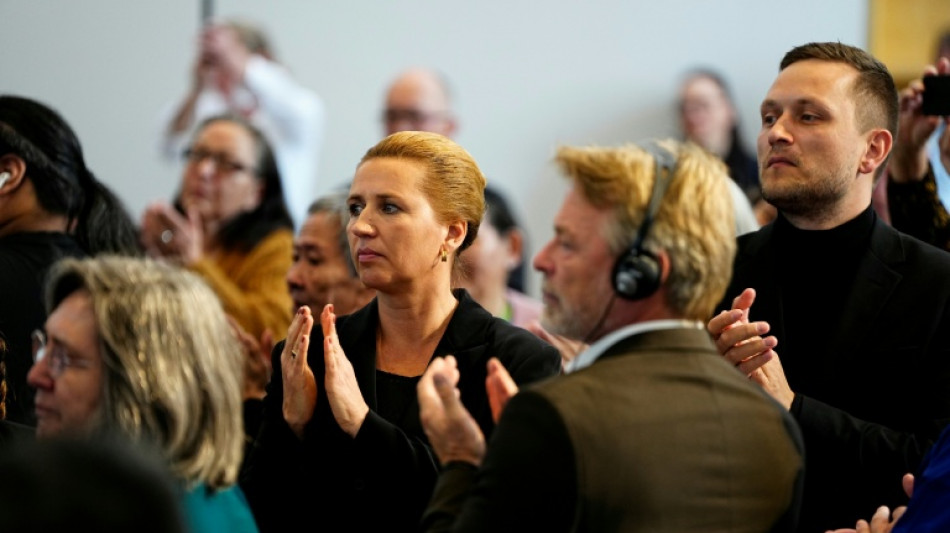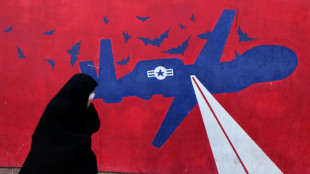
-
 Vonn to provide injury update as Milan-Cortina Olympics near
Vonn to provide injury update as Milan-Cortina Olympics near
-
France summons Musk for 'voluntary interview', raids X offices

-
 Stocks mostly climb as gold recovers
Stocks mostly climb as gold recovers
-
US judge to hear request for 'immediate takedown' of Epstein files

-
 Russia resumes large-scale strikes on Ukraine in glacial temperatures
Russia resumes large-scale strikes on Ukraine in glacial temperatures
-
Fit-again France captain Dupont partners Jalibert against Ireland

-
 French summons Musk for 'voluntary interview' as authorities raid X offices
French summons Musk for 'voluntary interview' as authorities raid X offices
-
IOC chief Coventry calls for focus on sport, not politics

-
 McNeil's partner hits out at 'brutal' football industry after Palace move collapses
McNeil's partner hits out at 'brutal' football industry after Palace move collapses
-
Proud moment as Prendergast brothers picked to start for Ireland

-
 Germany has highest share of older workers in EU
Germany has highest share of older workers in EU
-
Teen swims four hours to save family lost at sea off Australia

-
 Ethiopia denies Trump claim mega-dam was financed by US
Ethiopia denies Trump claim mega-dam was financed by US
-
Norway crown princess's son pleads not guilty to rapes as trial opens

-
 Russia resumes strikes on freezing Ukrainian capital ahead of talks
Russia resumes strikes on freezing Ukrainian capital ahead of talks
-
Malaysian court acquits French man on drug charges

-
 Switch 2 sales boost Nintendo profits, but chip shortage looms
Switch 2 sales boost Nintendo profits, but chip shortage looms
-
China to ban hidden car door handles, setting new safety standards

-
 Switch 2 sales boost Nintendo results but chip shortage looms
Switch 2 sales boost Nintendo results but chip shortage looms
-
From rations to G20's doorstep: Poland savours economic 'miracle'

-
 Russia resumes strikes on freezing Ukrainian capital
Russia resumes strikes on freezing Ukrainian capital
-
'Way too far': Latino Trump voters shocked by Minneapolis crackdown

-
 England and Brook seek redemption at T20 World Cup
England and Brook seek redemption at T20 World Cup
-
Coach Gambhir under pressure as India aim for back-to-back T20 triumphs

-
 'Helmets off': NFL stars open up as Super Bowl circus begins
'Helmets off': NFL stars open up as Super Bowl circus begins
-
Japan coach Jones says 'fair' World Cup schedule helps small teams

-
 Equities and precious metals rebound after Asia-wide rout
Equities and precious metals rebound after Asia-wide rout
-
Do not write Ireland off as a rugby force, says ex-prop Ross

-
 Winter Olympics 2026: AFP guide to Alpine Skiing races
Winter Olympics 2026: AFP guide to Alpine Skiing races
-
Winter Olympics to showcase Italian venues and global tensions

-
 Buoyant England eager to end Franco-Irish grip on Six Nations
Buoyant England eager to end Franco-Irish grip on Six Nations
-
China to ban hidden car door handles in industry shift

-
 Sengun leads Rockets past Pacers, Ball leads Hornets fightback
Sengun leads Rockets past Pacers, Ball leads Hornets fightback
-
Waymo raises $16 bn to fuel global robotaxi expansion

-
 Netflix to livestream BTS comeback concert in K-pop mega event
Netflix to livestream BTS comeback concert in K-pop mega event
-
Rural India powers global AI models

-
 US House to vote Tuesday to end shutdown
US House to vote Tuesday to end shutdown
-
Equities, metals, oil rebound after Asia-wide rout

-
 Bencic, Svitolina make history as mothers inside tennis top 10
Bencic, Svitolina make history as mothers inside tennis top 10
-
Italy's spread-out Olympics face transport challenge

-
 Son of Norway crown princess stands trial for multiple rapes
Son of Norway crown princess stands trial for multiple rapes
-
Side hustle: Part-time refs take charge of Super Bowl

-
 Paying for a selfie: Rome starts charging for Trevi Fountain
Paying for a selfie: Rome starts charging for Trevi Fountain
-
Faced with Trump, Pope Leo opts for indirect diplomacy

-
 NFL chief expects Bad Bunny to unite Super Bowl audience
NFL chief expects Bad Bunny to unite Super Bowl audience
-
Australia's Hazlewood to miss start of T20 World Cup

-
 Bill, Hillary Clinton to testify in US House Epstein probe
Bill, Hillary Clinton to testify in US House Epstein probe
-
Cuba confirms 'communications' with US, but says no negotiations yet

-
 Iran orders talks with US as Trump warns of 'bad things' if no deal reached
Iran orders talks with US as Trump warns of 'bad things' if no deal reached
-
From 'watch his ass' to White House talks for Trump and Petro


Danish PM apologises to victims of Greenland forced contraception
Danish Prime Minister Mette Frederiksen on Wednesday apologised in person to victims of a forced contraception programme in Denmark's autonomous territory Greenland that ran for more than three decades.
Between the late 1960s and 1992, Danish authorities aimed to reduce the Inuit birth rate by forcing around 4,500 women to wear a contraceptive coil -- or intrauterine device (IUD) -- without their consent.
Frederiksen said during a ceremony in Nuuk on Wednesday afternoon it had been a "betrayal that had major consequences for Greenlandic girls", adding: "On behalf of Denmark, I apologise."
Greenlandic Prime Minister Jens-Frederik Nielsen told the audience that the apology "does not mean that we accept what has happened".
Many of the women were left sterile and almost all of them have suffered from physical or psychological problems.
The scandal is one of several tainting Denmark's ties to Greenland, including forced adoptions and the removal of Greenlandic Inuit children from their families.
During the ceremony at the Nuuk Cultural Centre on Wednesday, many of the victims, dressed in black, wiped away tears and listened silently to the prime minister's apology.
Among them was Kirstine Berthelsen, who told AFP she had suffered two ectopic pregnancies, long hospital stays, operations and the removal of one fallopian tube -- issues she said were linked to the IUD.
Hearing the apology in person was vital to her healing process, the 66-year-old retiree said.
"I can then move on in my life without hatred, anger, and negativity eating me up from within," she said.
When some of the victims got a chance to speak at the event, they were greeted with a standing ovation.
- 'Good news' -
Denmark has been keen to smooth over tensions with its strategically located, resource-rich Arctic territory, which US President Donald Trump has said he wants to take over for security reasons.
At the end of August, Frederiksen presented a long-awaited apology to the victims of the forced contraception campaign, in a written statement.
On Monday, she also announced the creation of a reconciliation fund to compensate the victims, as well as other Greenlanders who suffered discrimination because of their Inuit heritage.
"It's very good news because my clients are not satisfied with just an apology," said lawyer Mads Pramming, who represents around 150 of the victims who have sued the Danish state for violating their rights.
"The timing is good. She would not have been warmly welcomed if she hadn't suggested (the compensation) in advance," he told AFP.
- 'External pressure' -
Aaja Chemnitz, an MP who represents Greenland in the Danish parliament, told AFP the apology was a direct result of Trump's assertive statements about taking over Greenland.
"It's the external pressure, especially from the United States, that is forcing Denmark to increase its efforts," she said.
"I've been an MP for 10 years and I've never seen so much effort until now."
Nevertheless, she said it would be an "important moment" for the women affected and for society as a whole.
Frederiksen has broken with the tradition of her predecessors who insisted Denmark had no reason to apologise.
"In the past, Danish prime ministers have always been extremely reluctant to acknowledge injustices committed in Greenland," said historian Astrid Andersen, a researcher at the Danish Institute for International Studies.
The scandal came to light when one of the victims spoke out in the media several years ago about the trauma she experienced.
A podcast series in 2022 then revealed the full extent of the campaign.
The Danish and Greenlandic governments agreed to launch an independent inquiry into the scandal, which was recently completed.
A separate inquiry into the legal implications of the campaign is still going on.
Its report, which is tasked with determining whether the Danish campaign constituted a "genocide", is to be published in early 2026.
I.Matar--SF-PST



